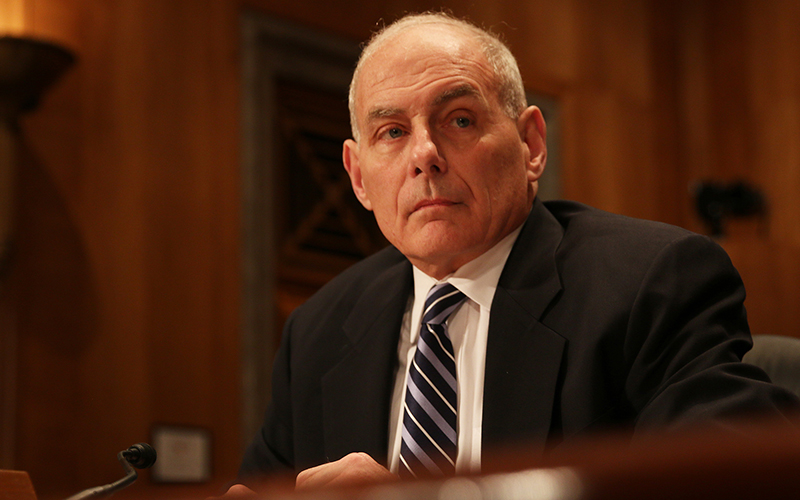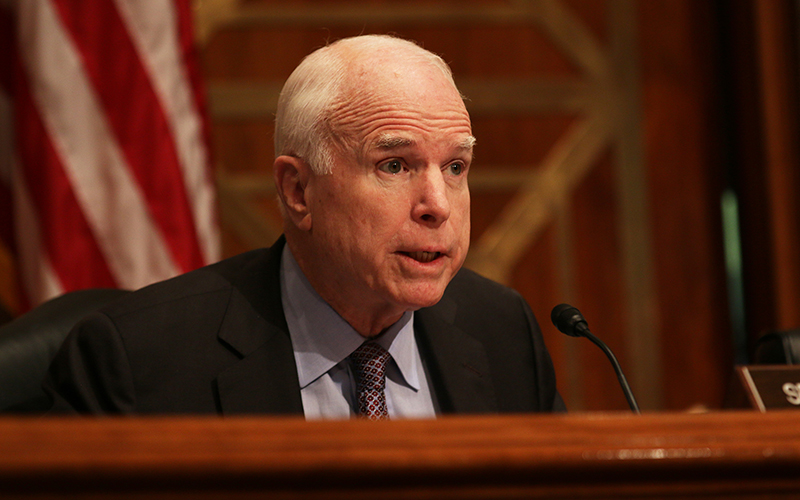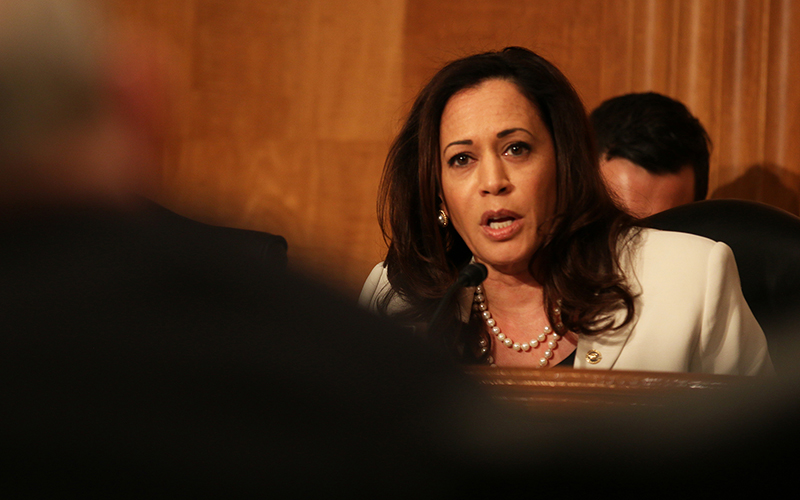
Homeland Security Secretary John Kelly faced tough questioning from senators on the Trump administration’s handling of border issues, including the wall. He said he expects different barriers than just a wall will be used. (Photo by Andres Guerra Luz/Cronkite News)

Sen. John McCain, R-Arizona, told Homeland Security Secretary John Kelly that he is concerned that Phoenix is becoming a major distribution point for Mexican heroin. In reply to the claim, Kelly said simply, “That is true.” (Photo by Andres Guerra Luz/Cronkite News)

Sen. Kamala Harris, D-California, pressed Homeland Security Secretary John Kelly to issue written directives to officers priortizing depotation of violent criminals, but Kelly said officers already know the policies. (Photo by Andres Guerra Luz/Cronkite News)
WASHINGTON – Homeland Security Secretary John Kelly told a Senate committee Wednesday that his department will not build a border wall “from sea to shining sea,” but will instead use a variety of techniques to secure the Southwest border.
His remarks to the Senate Homeland Security and Governmental Affairs Committee came one day after the same committee asked experts whether a solid wall was the only option for closing almost 2,000 miles of border with Mexico.
Kelly said Wednesday that while President Donald Trump has repeatedly pledged to build “a great wall” on the border, the administration understands that the wall may not be an actual wall across the entire Southwest border.
“Physical barriers do work if they’re put in the right places,” said Kelly, who told lawmakers that the president is giving him “elbow room” to choose how different areas of the border will be secured and where a wall or fence would work best.
Kelly said his department will listen to border agents, as “they know exactly where they want wall and they know exactly how long the wall should be in their section.”
Lawmakers from both sides of the aisle welcomed Kelly as “a voice of reason” in the administration – but that didn’t stop them from grilling him on a variety of issues during the hearing, in addition to the wall.
Those included demands to know how the administration will respond to falling morale among border patrol officers, as well as published reports of U.S. citizens having cell phones searched at airports, a practice that senators said invites invasions of privacy.
-Cronkite News video by Tyler Fingert.
Kelly defended the phone searches, saying they have been done in the past and are rarely done on U.S. citizens. The searches are primarily to screen for child pornography, Kelly said.
On the question of morale, Kelly said any drop was due to border agents not being allowed to do their jobs under the Obama administration. That is changing under his leadership and morale is already starting to rebound, he said.
Better morale or not, the department needs to “do one hell of a lot better job on this drug trafficking and human trafficking that’s coming across our border,” said Sen. John McCain, R-Arizona.
McCain said he is concerned about Phoenix being the major distribution point for heroin coming across the Mexican border from Sonora. Those concerns were echoed late Wednesday in an emailed statement from the Phoenix Police Department, which said “the vast majority of heroin seizures in the Phoenix area are traced back to criminal organizations based in Mexico.”
McCain did not place all the blame on Kelly for missteps by the administration, citing Trump’s executive order freezing travel to the U.S. by refugees and banning travel from all visitors from seven majority-Muslim countries. Those orders have twice been put on hold by federal courts.
“Next time you do a travel ban, how about thinking it through,” McCain said.
Sen. Kamala Harris, D-California, said that a recent Kelly memo on deportation priorities among undocumented immigrants has opened the door to deportation of people who are here illegally, but are not criminally violent.
She pressed for a written directive clarifying the policy, to restore focus on violent criminals. When Kelly said he had issued an oral directive to that effect, Harris was having none of it, saying that immigration officers have “wide discretion to exert and use their authority.”
“It is critical that you communicate the policies of leadership to everyone at every stage, including those at the lowest level,” Harris said.
Despite some disagreements, senators and the secretary found common ground on wanting to secure the border, maintain cooperation with Mexican authorities on border issues and rely on localities to tell the department how the border plan should be implemented.
“We face diverse challenges and adversaries that do not respect our rule of law or our borders,” Kelly said in his written testimony. “As secretary, you have my commitment to tirelessly protect our country from threats, secure our borders and enforce our laws.”